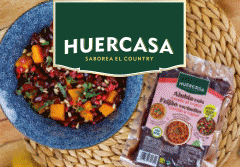The French company was created 50 years ago as a result of the need for cooperatives to join their synergies together to sell their produce overseas.
Blue Whale’s story started in 1969, when a group of French farmers decided to join forces and share production and marketing resources. From the 1960s to the 1990s, these producers sold their apples together, but they continued to compete in Europe. In the 1990s, they joined together to sell throughout Europe and the rest of the world.
Today, it is the largest French group of cooperatives, with 300 producers, almost 300,000 tonnes of fruit marketed in the 2018/2019 campaign and 250 million euros in sales.
The company is present in 70 countries and its shipped exports reached 3,800 containers in the 2016/17 campaign.
Its main destinations are: France with a market share of 26%, England (20%), Asia (13%), Middle East (14%), Spain and Portugal (11%), the rest of Europe (8%), America (4%) and Scandinavia (2%). Regarding the Spanish market, they expect to increase their volume due to proximity and because they have developed varieties for shipping by sea that work very well in Spain.
Produce
Apples are the main fruit marketed by Blue Whale, with 225,000 tonnes. By varieties, Royal Gala (that is being improved thanks to new clones) has the greatest relevance, with 60,000 t; followed by Pink Lady® (they produce 25% in Europe), with 45,000 t; Granny Smith (with fewer sales in Europe, but that is very important on other markets), 28,000 t; Golden (this apple is decreasing because there is already a large volume in Europe and it is difficult to get a good price for producers), 17,000; Fuji (which will end up taking over from Golden), 15,000 t; and 15 other varieties with less volume, but no less importance, such as Braeburn (which is going to disappear from its portfolio as it is only sold in England and Germany and they have their own production), Joya® Canadá Gris, Ariane®, Tentation®…
In its eagerness to offer new varieties that differentiate the company from its competitors, its latest commitment is to Candine®, an apple it has been working with for the past 2 years alongside the Italian company Apofruit and that can be used both for conventional and bio production. And, on the other hand, there is Kissabel®, a fruit that is orange on the outside and red on the inside, with a balanced flavour.
Kiwis are the company’s second product by volume, with 5,000 t, of which 4,000 correspond to green and the remainder to yellow. At present, they have a project with Zespri® to grow Zespri Gold® kiwis on 200 hectares, and in 3 years they expect to reach 6,000 t.
Their third fruits are plums with 5,000 t (they are currently developing the brand Metis®, along with the Spanish company Royal). This is followed by pears, with 4,000 t and grapes with 1,000 t.
New challenges
Blue Whale maintains a clear commitment to ecological produce. In 2018, it devoted 68 hectares to the production of organic varieties. The brands that cover these fruits are ‘Les Fruticulteurs Bio de Nos Campagnes’ for France and ‘Blue Whale Organic’ for exports.
The varieties used by the company for its bio produce are apples that already have natural resistances to make it easier to grow them. For the Spanish market, the most interesting ones are Candine® and Pixie Crunch. At the beginning of October they started to load their first pallets.
The next project is Zero Residue. At present, they are only developing this for the French market with 1,000-2,000 t and they are going to carry out an important promotion plan using the television.
Promotion
According to the executive, Marc Peyres, “today, the European market is saturated, therefore we must invest in new varieties that manage to offer the qualities new consumers are interested in. But in order to develop a new variety, a great investment is needed and not all the supermarkets are ready to give you a space on their shelves.”
For this reason, Blue Whale is carrying out tasting sessions in the supermarkets themselves so that consumers can try and ask for this new apple. They have their own offices in Thailand and Brazil that are in charge of carrying out these campaigns. In Spain, the promotions are carried out in the wholesale markets, as the company sells most of its produce through traditional greengrocer shops.
Gastronomic tour
At the beginning of October, Blue Whale invited several Spanish journalists to visit its installations and crop fields, as well as trying several French dishes prepared by famous chefs, accompanied by different varieties of their apples.
The Stanor cooperative
Germain Vidil, the sales manager of the fruit and vegetable centre, and Stephanie Carminati, sales manager for Spain and Portugal, gave us a guided information tour. Stanor is the largest Blue Whale cooperative, with a harvest capacity of 1,000 t of apples daily and it can pre-calibrate 400 t per day. The installations have 150 cold storage rooms for apples, of 400 and 200 t.
“The strength of our group lies in the fact that we fill a cold room with a variety in one day and the storage time is reduced. The apples are pre-calibrated in a day and the produce is on sale in a week,” Vidil indicated.
With regard to marketing, Carminati commented that for Stanor “Spain is possibly the first destination country according to volume, but France is the leader regarding price.”





















